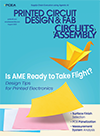-

Choosing the Right Surface Finish
Balancing environment, shelf life – and cost. READ MORE...
-

Elements of PCB Panelization
Panelize to optimize: faster builds, better boards. READ MORE...
-

Flexible Heater Temperature Limits
How high can they go? READ MORE...
-

Collaborating with Service Bureaus
Time-to-market advantages encourage getting designs to scale quickly. READ MORE...
-

Optimizing Mixed Signal Circuit Designs
Navigating the analog and digital worlds. READ MORE...
-

Developing Organizational Culture for Troubleshooting
Solving problems and adding value. READ MORE...
Homepage Slideshow
Choosing the Right Surface Finish
Balancing environment, shelf life – and cost.
Elements of PCB Panelization
Panelize to optimize: faster builds, better boards.
Flexible Heater Temperature Limits
How high can they go?
Collaborating with Service Bureaus
Time-to-market advantages encourage getting designs to scale quickly.
Optimizing Mixed Signal Circuit Designs
Navigating the analog and digital worlds.
Developing Organizational Culture for Troubleshooting
Solving problems and adding value.



